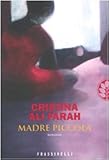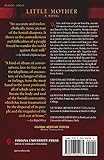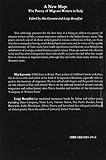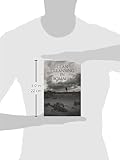"A woman of our group says: My village is the bundle on my back."
Mahmoud Darwish
Ubah Cristina Ali Farah is emerging as one of the most crucial poets and novelists in the contemporary Italian literary scene. In a country immersed in a deep involution, her work seems to be a lifeline in creating cultural awareness of diversity and, by extension, in shaping a new Italian identity. Italians of African descent and migrant voices, whose children born on Italian soil are now fighting to be recognized as first generation Italians, are finally starting to gain the cultural and political prominence they deserve. Italy, a country politically broken and culturally impoverished, seems to be on the verge of a deep reckoning with its colonial past and its latent racism; this unique convergence is leading to a spring of new voices and Cristina finds herself at the center of it.
Cristina’s novels and poems rotate around the dramatic trajectory of a writer escaping from war torn Somalia with a newborn in her arms. Born in Verona, Italy to a Somali father and an Italian mother, she grew up in Mogadishu where she attended an Italian school until 1991, when the civil war left her no choice but to escape. War and humanity is the crossroad from which the distinct voice of her subjects emerges—a deep compassion found muffled by history’s schemes of power. As a migrant writer she carries within herself the sufferance of her country, as a poet the rich vision of her multilinguism. Civil war and the consequent forced exile are in the foreground of her first novel, Madre Piccola (Little Mother, 2007) written in Italian. Barni and Domenica, two cousins bonded since birth by a deep love for each other and then separated by the social turmoil of their country. Domenica leaves Mogadishu and begins her journey, lost and confused, within Europe and the United States. Barni on the other hand reaches Rome, where she becomes an obstetrician. The two cousins are finally reunited after years of separation when Domenica arrives in Rome to give birth to a son. Barni becomes the little mother, a literal translation of the Somali habaryar which gives a deeper and maternal meaning to the word aunt. The two begin a process of painful recollection and healing. The story is told from the perspectives of the protagonists and enhanced by a chorus of additional characters who reframe the struggle and suffering undergone by an entire nation through their own experiences. In spite of the separation, loneliness and alienation they face, all the characters manage to constantly find a center through their profound sense of care towards one another—here the loving allusion of the title comes full circle. I have encountered this distinct compassion every time I have had the privilege to speak with Cristina in the last two years.
Her work, along with the one by the new generation of migrant voices from Italy, is central in revitalizing the centuries old questione della lingua, the Italian dilemma in dealing with its dialect-rich language and the necessity for one language that could encompass its north-south divide. Poet and critic Mia Lacomte says, “Italy has always searched for a unitary language, periodically questioned and debated, and today, in a situation of political and cultural stagnation, in which Italy is strongly influenced by the language of advertising and the media, in a linguistic and literary homogenization which tests the very existence of poetry, this very language of migration, timely and naturally revolutionary, vital, holds the promise to restore Italian to its true richness.” Pier Paolo Pasolini underlined, time and again, the role of literature in shaping a sense of a unitary language against the backdrop of an impoverished standardized Italian. Today, it is through writers like Cristina that Italy can find a lifeline to its painful cultural and human involution.
Veruska Cantelli: In your novel Little Mother there is a constant temporal and spatial shift (past and present, Somalia-Netherlands-Italy) from childhood in Somalia to a terrifying escape, to constant readjustment, rebirth, exile and motherhood, all the way to Domenica's double identity. These are topics very close to your own personal life experience.
UCAF: Yes, that’s true. In its original form, the novel was a collection of stories whose characters were people from my generation. Then, I realized that in each story there was a kind of split, their lives were divided in half as it were, by a traumatic event, the civil war. It is not a coincidence that the central chapter of the novel, the Interlude, is set in January 1991. This was the first part of the story that I wrote, and I hardly needed to change it. As they pass through the civil war, each character experiences something that irrevocably changes their future. Lidwien Kapteijns in her recent book Clan Cleansing in Somalia: The Ruinous Legacy of 1991 addresses this very subject. Her historical and scientific analysis is rigorously accurate and until there is a discussion and a public recognition of what happened in Mogadishu during those days, any and every attempt at reconciliation is destined to fail. Reading Lidwien’s essay was extremely painful for me, yet cathartic at the same time. I knew that it would unleash a fierce debate among Somalis and I think she was very brave to tackle such an important subject.
VC: What is your relationship to a language that belongs to a former colonial power in Somalia, the language that you have chosen for your writing?
UCAF: I was raised in Mogadishu by an Italian mother and that is perhaps why I have never perceived Italian as a language associated with colonialism. This does not mean that I do not consider the fundamental importance of this concept. For example, in Little Mother, one of the characters, the most political of the voices in the story, inserts into her conversations Somali variations of Italian words, thereby suggesting a reversal of power between the two languages.
My father went to study in Italy on a scholarship and that’s how my parents met. Italian was most certainly the language of the elite in Somalia, of those who had studied, but those were also the years of real Socialism, when the Somali language was officially transcribed and an entire generation fought for learning to be conducted in the Somali language. This undertaking was viewed with great pride, with exceptional enthusiasm.
However, for several reasons (overcrowded classes, ill-prepared teachers) my parents decided at a certain point to send me to the Italian School so you can say that my formal education came about in that language. It’s quite funny to think that I studied the regions of Italy, the Risorgimento, Manzoni’s “The Betrothed,” but nothing of Somali history, of its poetry, or the names of the trees and flowers. Paradoxically, I was able to remedy these gaps in my education right here in Italy!
VC: The multiple voices in Little Mother seem to be related to an ideal of collectivity among women which is also echoed in your poem "The Split" that appeared in the anthology A New Map: “We wash with other women./ My children are their children./ I want to hold together all the pieces./ Putting on a dress with the others./ Without them, women young and old,/crippled, lovely, white and black,/ I don't exist./ I am a woman as long as they exist."
UCAF: The title of the novel, Little Mother, is the translation of the Somali term habaryar indicating a maternal aunt, but translated literally it means little mother. Motherhood in the novel is not just an individual experience, but a collective one: not just a biological event, but also a social one. It is not coincidental that one of the main characters, Barni, is a midwife but not a mother. In the context of migration, women remain more anchored to the earth, thanks to their daily routines and to their more intimate interaction with the society around them. Often it is more difficult for the men: they feel disempowered and, disoriented, mere empty shells.
Let me tell you about a particular incident. When I got married in Mogadishu, I wasn’t yet seventeen years old. When someone gets married, it is customary to engage a woman poet to sing the praises of the couple’s ancestors. This poetic form is called a buraambur and it is exclusively female. During the celebration, the poet recites her verses and all the women dance in a circle to honor the bride. The bride cannot participate in this. As soon as I heard the women singing, even though it was forbidden, I ran outside to join the circle. I adored the buraambur. Of course, they chased me away! But you see, I was always attracted by the idea of collectivity, by the circle of the story, you could say.
VC: Let’s talk a little bit about the importance and influence of storytelling in your work.
UCAF: Storytelling has always fascinated me. I was raised in a country of great raconteurs. Each story could stretch on forever, each detail giving rise to another story. If I had to define my work, I would say that it is nothing less than an attempt to orchestrate and give back the stories that were told to me.
Two sources in particular have been crucial for me. The first, in order of time, are my telephone conversations. You know, especially in the early years when I didn’t even have a cordless phone, I spent hours glued to the telephone, sitting at a table. Partly for fun, partly to keep focused I started to write down the stories I heard. They seemed exceptional to me, not because they really were, but because they were so ordinary. We didn’t tell each other important things, but we talked about what we were doing at that particular moment, small details that on the surface were insignificant, but that had the power to obliterate the time and the miles that separated us. Many of those telephone stories ended up in my writings.
Another source, or resource, for me was a series of oral stories by migrant women that I collected in the Torre Angela neighborhood in Rome, on behalf of the Kel’lam Association and of the Gianni Bosio Society. Alessandro Portelli, who has made a special study of oral history, was an excellent guide in this endeavor. The women narrators came from many different places and, transcribing our taped conversations, I realized that the rhythm of the Italian version echoed their mother tongue, resulting in a powerful subversive and poetic force.
VC: Last time we spoke, you mentioned your collection of Somali stories and sayings at the Roma Tre Library. Can you talk about this project?
UCAF: For the last few years I have worked in the Archivio Somalia at the University of Roma Tre. One of the main objectives of the project is to digitize and make available online the vast quantity of material stored at the Center for Somali Studies. These include different kinds of documentation, written texts (edited and unedited), magazines, posters, signs, photographs, conversations, plays, radio dramatizations, videos, musical pieces. In the absence of libraries and a politically stable situation, preserving the memories of the past and sharing it with the diaspora constitutes a significant cultural undertaking. Therefore it’s not a coincidence that there is a strong presence of the Somali community on the web.
VC: It is the presence of multiple stories and perspectives that provide the narrative, the pieces that are put together recount the Somali diaspora. And the Prelude marked by the repetition of "Somaali baan ahay" (I am Somali) makes its entrance almost as a form of declaration of Somali identity.”
UCAF: Soomali baan ahay is the title of a song by Yamyam, composed in the years immediately after independence. It refers therefore to a particular historical moment in which “I am Somali” meant “I am proud of who I am” and above all, “I am free.” The Prelude in the book is a chapter dedicated to the childhood of the main characters, the golden era of their lives, but also of the newly independent Somalia. In the novel there are three narrating voices that resurface three times: each one relates her – or his – story to an interlocutor, once outside of each one’s personal cultural context, once within it. Through the fabric of these interlocking voices, one time close, the next distant, I wanted to tell the story of the diaspora. The question I asked myself was this: how do individuals who have lost all their points of reference, put down roots again, start a new life? The characters look for the answer in relationships: it is through them that we regain our sense of self and our way of being in the world, our most genuine identity.
VC: In Italy as Flavio Rizzo observed, “It is time to start to build a new sense of critical citizenry, one that does not fall into the traps of the invisibility of history or the emergence of institutional racism. A sheer relentlessness in addressing episodes of racist violence and vulgar disparity and ushering in a new age of curiosity would be the simplest of tools by which to go beyond a pervasive culture of exclusion and passive acceptance.” In Italy there is a nationally endemic loss of memory linked to suffering, what one could simply call a lack of compassion in its purest form, as defined by Jean Luc Nancy: “not compassion that feels pity for itself and feeds on itself. Compassion is the contagion, the contact of being with one another in this turmoil. Compassion is not altruism, nor is it identification; it is the disturbance of violent relatedness." It is to Italy, in this very context, that you have returned in your new novel.
UCAF: I am in complete agreement. I’m not sure if I can express it clearly, it is such a simple thought: the fact is that when people think of the boat landings or of the people who are arriving, they experience feelings mixed with pity and horror, because the protagonists are presented as a shapeless mass, wounded and threatening. But if people stop to consider the individuals, their stories, how they came here, what strikes them above all is their optimism and passion for life. You have to possess incredible inner strength to face separation, the journey, the disorientation. If people could only see this reality, they would be enlightened and amazed. You cannot feel pity or fear for those who have demonstrated this strength, it can only be a positive experience.
The book I am working on could be described as a novel of formation.
The protagonist is an eighteen year old boy, born in Somalia but raised in Rome. What interested me was to trace the mental processes through which one’s personality/identity is formed, the cultural points of reference of the imagination, the way of experiencing relationships. It is a process of initiation in which the young man questions power and authority, in which his “mythical origins” dialogue with the surrounding reality, the environment in which he is being raised.
VC: The reality of Somalis in exile in the city of Rome (and all over Italy) is central to the novel, including the level of racism and lack of compassion that emerge in the story about a mute Somali who is wrongly targeted as a terrorist; a story like many others we have seen over the last two decades of migration.
UCAF: The theme of having a voice (and of silence) is something I care deeply about. Barni, one of the main characters, is a midwife into whose hands new babies are born, but she is also the person who helps those who have lost their voice, specifically the young mute, and she is also the beloved cousin of Axad/Domenica. In Italy the situation of the Somalis is rather unique, rather dramatic: on the one hand there is a community that existed before the outbreak of the civil war, on the other there are those newly arrived. The Somalis have a great sense of humor and they call the former ones, “Old liras” and the latter who have just arrived, “Titanics.” In recent years the older community is dwindling in number little by little because Italy is a country that rejects people, and those who might have acted as catalysts between the new arrivals and the surrounding society, find themselves forced to try their luck in countries that are more open, where certain fundamental rights are respected.
VC: You have recently been part of the Festival in Lampedusa, an area that has faced the greatest tragedy of migration in Italy. Can you tell us about your collaborative work there?
UCAF: Lampedusa in Festival is an amazing experience. It came about through the efforts of the people who live on the island and it is constantly expanding. Of course, there are the movies being screened for the competition, but also book presentations, debates, exhibits, concerts. Lampedusa is also a big tourist spot, and in the streets of the center, in addition to the islanders themselves you can meet migrants who have just got off the boat and people on vacation. The main events of the Festival are held in very crowded public areas where those passing by cannot ignore what is going on. What’s more, this year the Lampedusa and Linosa Museum of Migration founded by the Association Askavusa - that rescued articles which had belonged to the migrants from the dump - presented the first results of the cataloguing and preservation of these objects, a process started in 2012. The objects evoke existences, they tell the story of journeys that cannot be forgotten. I think that, in the current squalor and decadence into which Italy is sinking, Lampedusa stands out as a truly rare pearl of humanity, culture and beauty that everyone should seek to nurture.
Translators
Giovanna Bellesia-Contuzzi is a Professor of Italian Language and Literature at Smith College. Her research work has centered on Italian women writers and on the writings of recent immigrants to Italy. She has also translated several texts, along with her colleague Victoria Poletto. Their most recent publications are Little Mother, a novel on the Somali diaspora by Cristina Ali Farah, published by Indiana University Press in 2011 and Queen of Flowers and Pearls: The Story of Ethiopia and the Italian Occupation by Gabriella Ghermandi, fortcoming, Summer 2014 (Indiana University Press).
Victoria Offredi Poletto was born and raised in England and Italy of Italian parents and has resided in the USA for the past thirty-five years. For twenty years she taught Italian as Senior Lecturer at Smith College. Since her retirement in 2007 she has collaborated with her colleague, Giovanna Bellesia, in translating a variety of works, both online and for publication, by immigrant women to Italy (see above) who give us a new understanding, not only of what it means to be writing in Italian in the twenty-first century, but who deliver a message that profoundly resonates with immigrants all over the world.
Veruska Cantelli is Senior Editor at Warscapes magazine.




